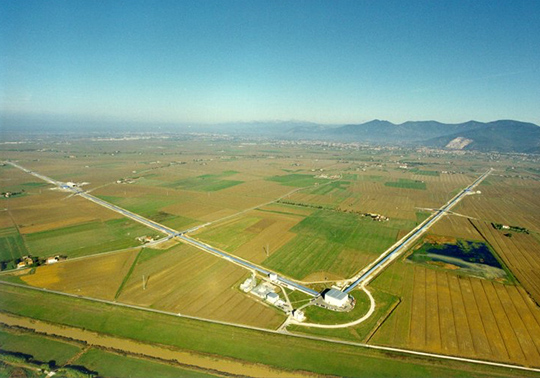The opening of Advanced Virgo, an international observation project of gravitational waves with the collaboration Universitat de València
- February 20th, 2017

Advanced Virgo, the international observation project of gravitational waves in which collaborate experts of the Universitat de València, is open today Monday in Pisa. Advanced Virgo will raise the sensitivity of detection and allow the exploration of the volume of the Universe, a thousand times larger.
Advanced Virgo will be able to observe the last minutes in the life of a set of pairs of compact stars, such as neutron stars and black holes; while these bring closer in spiral until they finally fuse together in a bigger object. It will also allow to locate periodic signals of well-known pulsars that twirl around at about 1000 revolutions per second. The project Advanced Virgo is a significant improvement of the interferometer Virgo.
The gravitational waves are the new tools of the observational astronomy and with their help, it would be possible to study the violent phenomena of the Universe, such as the death of the binary systems composed of neutron stars and black holes, supernova explosions and the processes that took place in the primitive universe shortly after the Big Bang. This phenomena will provide unique opportunities to explore the gravitation in extreme conditions and prove its theory: the general relativity. Advanced Virgo will also cooperate to detect gravitational waves and contribute to this new era of physics and astronomy.
A team of ten Spanish researchers of the departments of Astronomy and Astrophysics, and Mathematics, of the Universitat de València, coordinated by José Antonio Font, has joined the Virgo Collaboration last 1 July 2016.
This scientific collaboration is composed of an international research and technical team that works together in the construction, validation and operation of the interferometer Advanced Virgo, with the aim of developing the emerging field of physics and astronomy of gravitational waves. Nowadays, around 250 people are members of the Virgo Collaboration, distributed in different institutions from six European countries - France, Italy, Poland, Hungary and, since July 2016, Spain. At the same time, Virgo Collaboration, has cooperation agreements with LIGO Scientific Collaboration, linked to both American interferometers Advanced LIGO. They are in charge of the historic detection of gravitational waves announced recently, GW150914 and GW151226, a scientific milestone never before seen.
The university team, the only national group member of Virgo Collaboration, facilitates collaboration in various lines of research: from the development of algorithms for the gravitational signal analysis and the parameter estimation of astrophysical sources, to the generation of gravitational radiation patterns by techniques of numerical relativity, going through the development and application of numerical methods for the detection and classification of instrumental noise sources in the advanced detectors.
The installation of Advanced Virgo has finished and its commissioner is making rapid progress in the first stage of the data collection.
To celebrate this milestone, an opening ceremony will take place at the European Gravitational Observatory in Cascina (Pisa), in which some representatives of the national governments and chairmen of the scientific organisations of the Virgo Collaboration will participate.
In the name of the Spanish authorities, Salvador Fortes Alba, general secretary of the State Research Agency, will attend the opening ceremony of Advanced Virgo. The coordinator of the team of the Universitat de València, José Antonio Font, will also take part in this event.
Webpage of Virgo detector: http://www.virgo-gw.eu/
















